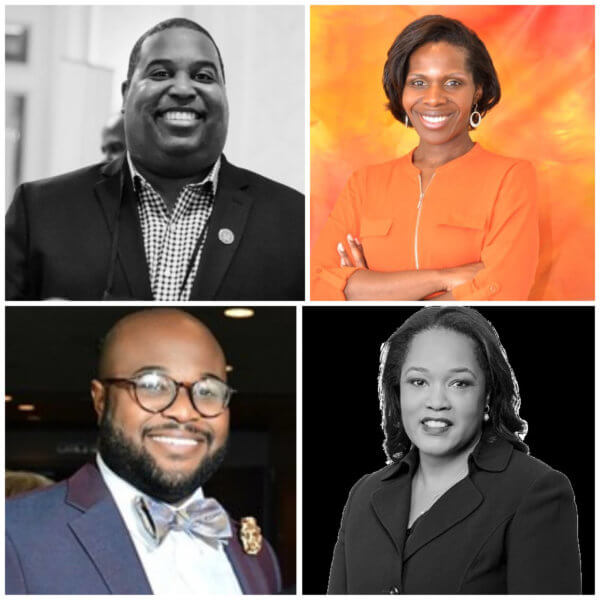
Black History Month: Perspectives
In closing out Black History Month 2022, we’d like to share thoughts from some of our dedicated board members. They are mentors and leaders in our community. We are inspired by them every day. I’m sure you will be as well.
HENRY FLOYD – ASSOCIATE ATTORNEY AT KOONZ MCKENNEY JOHNSON & DEPAOLIS LLP 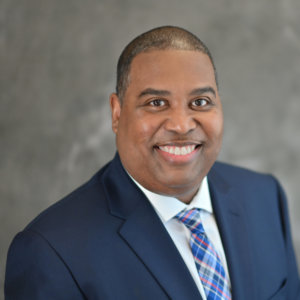
Why did you become a lawyer?
I knew I wanted to be a lawyer at a young age when I would watch sitcoms with lawyers but rarely saw anyone that looked like me. I would say to myself, “I can do that.” I became a lawyer because I wanted to help people (cliché but true), but I became passionate about being a lawyer when I began to actually witness the injustices of the legal system. Growing up in deep south Mississippi, you get a firsthand account of how racism looks and works. I became a lawyer so I could contribute meaningfully to dismantling a system that was built to disenfranchise and destroy people who look like me.
Who were your influences?
I had two major influences in my life – Johnnie Cochran, Jr. and Willie Gary. I was 13 years old when I witnessed the greatness of Johnnie Cochran in handling the O.J. Simpson trial. The way the trial piqued my interests confirmed to me that I wanted to be an attorney. Unfortunately, I never met Mr. Cochran but I worked at the Cochran Firm DC during and immediately following law school and it was an experience I will never forget.
Similarly, I would read about this brilliant black attorney in Florida who was securing large verdicts against huge corporations and knew I wanted to be like him. On top of that, he owned his own private jet and I wanted one. Through my affiliation with the National Bar Association, I have been blessed to not only meet but also converse and honor Mr. Gary for his accomplishments and contributions to the legal profession.
Do you have lawyer heroes that you look to for inspiration?
I have been blessed to meet and interact with some on the most brilliant legal minds in this world. Following college, I interviewed for a paralegal position with a district court judge in Hattiesburg, Mississippi, because I wanted work experience in the legal field prior to attending law school. It was one of the best decisions I ever made in my life. The Honorable Deborah J. Gambrell taught me about the ins and outs of the legal profession, how to practice law with integrity, and forced me to apply to law school and guided me through the process even though it meant me leaving her side. She taught me how to care about my community. When you care, you go above and beyond for their well-being and fight harder for their rights. To this day, she remains at the top of my list of lawyer heroes because she took the time to care about me and my future. She’s also just a badass lawyer and jurist!
What challenges did you face to entering the practice? How did you overcome them?
The biggest challenge I faced to entering the practice was the lack of knowledge of legal resources. During high school, I didn’t know anyone who could guide me in the direction of a legal career. During college, I wasn’t aware of any pre-law programs that would connect me with legal professionals or resources. Every decision that I made about my future was my own independent research and trial and error. I had to make mistakes in order to learn which direction I needed to go. Ultimately, some of those early decisions affected the opportunities I may have been able to take advantage of. I overcame those challenges by asking more questions, doing more research, getting involved with different organizations and connecting with amazing people who are just as invested in my success as I am.
What advice would you give to high school students to get them thinking about grad school?
My advice would be to have honest conversations with themselves about their interests and what would make them happy. Life is too short to do anything other than what makes you happy. Do as much research as possible about the area(s) that interests them. Speak openly with their parents about what they think their career path is and get their parents involved in the process. Trust me, they will need the support. Finally, my advice would be to connect locally with individuals who are working in the same space that interests them. The feedback and firsthand accounts can make or break their decision about their futures.
YAIDA FORD – MANAGING PRINCIPLE OF FORD LAW PROS, PC 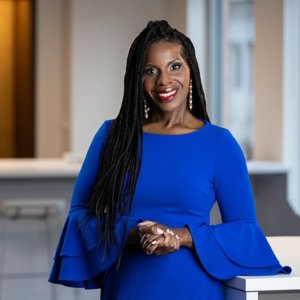
Why did you become a lawyer?
I watched the movie “Separate But Equal” when I was 7 years old and didn’t know what a lawyer was at that age but I knew I wanted to be like Sidney Poitier’s character who I later found out was Thurgood Marshall – a badass lawyer turned Supreme Court Justice.
Who were your influences?
Constance Baker Motley, the first Black woman to ever be a federal judge. Earl Ford, a staunch civil rights activist who picked cotton to put himself through college, who also happens to be my dad.
Do you have lawyer heroes that you look to for inspiration?
Donald Melvin Temple and J. Wyndal Gordon.
What challenges did you face to entering the practice? How did you overcome them?
I was very young when I started practicing, and I had never run a business. I had no mentors to start. I enjoyed litigation and trial work but had to learn to balance time between client work and the business side of my practice. I’m not quite sure I’ve accomplished that yet but I’ve developed a huge network of Black professionals who specialize in all sorts of things, so I literally have the best accountant, bookkeeper, and financial planner on the planet, and they are all people of color and frankly, they all referred me business long before I hired them.
What advice would you give to high school students to get them thinking about grad school?
Don’t do it unless you are passionate about your dreams. Money is not enough of a motivator to invest years of your life in getting a degree that you may or may not use. You need to be completely convinced about your goals so that when challenges come you will persevere.
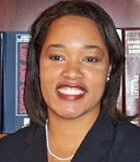 GWEN WASHINGTON – PRO BONO ATTORNEY AT CLEARY GOTTLIEB
GWEN WASHINGTON – PRO BONO ATTORNEY AT CLEARY GOTTLIEB
Why did you become a lawyer?
I wanted to go into civil rights because I witnessed a great deal of racial and gender discrimination growing up in Virginia Beach. I wanted to work to right centuries-old wrongs in my community.
Who were your influences?
My grandparents were local civil rights activists. Though they were both blue-collar people, they had aspirations for the children and grandchildren to have better lives than their own – that meant having equal opportunities in society, from education to employment and housing. I didn’t know any lawyers growing up.
Do you have lawyer heroes that you look to for inspiration?
Charles Hamilton Houston is my lawyer hero – known as the Man who Killed Jim Crow. Houston was the architect of successful legal challenges to Plessy v. Ferguson and inspired public interest law – in my opinion. Houston coined the term social engineer, meaning “a highly-skilled, perceptive, sensitive lawyer who understood the Constitution of the United States and knew how to explore its uses in the solving of ‘problems of . . . local communities and in ‘bettering conditions of the underprivileged citizens.’” I have several mentors who have guided me along the way in that vein.
What challenges did you face to entering the practice? How did you overcome them?
As a first-generation lawyer, I didn’t have a great deal of guidance in making decisions in career development. I knew that I wanted to be a public defender and to be a civil rights attorney, but I had no guidance or awareness of the steps needed to climb the legal career ladder (many of these steps were essential to know in law school). Plus, I landed in heavy law school debt. The debt closed doors on opportunities to advance in the public interest world because the salaries were too low to support my family and me. I overcame these obstacles through networking and professional development – Washington Council of Lawyers was extremely helpful in this regard.
What advice would you give to high school students to get them thinking about grad school?
I would tell any high school student to reach out to professionals in the career path of your interest. When I was in high school, there was no Internet or other resources to tap into for guidance – outside of the guidance counselor. I would definitely ask your guidance counselors for advice. Grad school is a stepping stone to a great career. Do the research and prepare yourself for that goal before you start applying. I would focus on internships and externships that expose you to opportunities to work in the field that piques your interest to if that field can hold your interest. Always have a thirst for knowledge – education is never-ending. Most importantly, don’t let anyone tell you that you cannot do something simply because of the way you were born. Wherever there’s an obstacle, there’s always a way to defeat it.
STEPHON WOODS – GOVERNMENT ATTORNEY 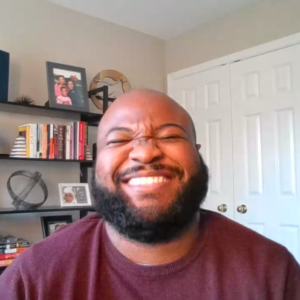
Why did you become a lawyer?
I became a lawyer because I recognized at an early age that despite the progress our nation made during the civil rights movement in passing legislation to prohibit discrimination, systems had functioned for so long in a discriminatory manner that the full promise to minorities, specifically Black people, had not been realized. I recognized these issues as early as middle school, seeing the inequities people faced in grade school when it came to educational opportunities. These inequities were not always based on what neighborhood people lived in and what funding opportunities were available, but inequalities also existed in a single school in terms of what opportunities were given to individuals who were placed in “honors” classes versus “standard” classes. It amazed me and frightened me that I could go to the same school as many of my family members and have a drastically different outcome based on the opportunities provided. I figured one of the best ways to combat that type of injustice was to become a lawyer to enforce what had been promised to those less advantaged.
Who were your influences?
My biggest influence, as cliché as it sounds, is my mother. When I was in grade school, she was a huge advocate for me and my siblings. Eventually, she beat the odds against her as a single mother of two boys and successfully campaigned for a position on the local school board. Her campaign slogan was “More Parents, Less Politics,” which showed me that those most affected by certain policies should have the biggest voice at every level of decision-making. But what stands out to me most about her time in political office is not that she beat those odds and won the position, but instead, it was when I graduated from public school and started college, she stepped down from her position as a school board representative because she wanted to create room for more parents of students currently in public school. Her commitment to her principles is one area where I try to make her most proud. She has also been a lifelong advocate for the underserved, something I hope to be as I continue my career in the law.
Do you have lawyer heroes that you look to for inspiration?
I look to Judith Browne Dianis, the Executive Director of Advancement Project in Washington, DC. I interned there back in 2014, and that position was my introduction into community lawyering. Judith is an accomplished civil rights advocate who employs the perfect combination of advocacy and community organizing. I appreciate how she and her entire team understand that the movement to effectuate change happens best when you mobilize a community around an issue that is important to them and allow them to take the lead in that work. To me, lawyering isn’t about being the biggest and loudest voice at the table, but rather amplifying the voices of others to tell their stories. I learned from Advancement Project how to be the tailor, while the community members wear the suit and act as the face of the movement.
What challenges did you face to entering the practice? How did you overcome them?
One of the biggest challenges I faced in entering the practice of law is what people know as the “imposter syndrome.” For those unfamiliar with the concept, it basically refers to the doubt someone feels in their abilities and negative thoughts about whether they deserve certain positions or accolades. I think the feeling is heightened for minority attorneys where there is not much representation in the legal profession to show the possibilities of what could be. I also think societal pressures such as general questioning of minorities’ abilities and qualifications contribute to the feeling. When I started practicing, I felt I had a lot riding against me, having not gone to a law school in DC, having not pursued certain “traditional” law school extracurriculars such as being editor of the law review, judicial clerkships, etc. The only way I knew to get over the feeling was to trust that my law school had prepared me to be able to learn about the practice of law, to know that people believed in me enough to give me the opportunity and to be patient with myself. I realized that I could not be an effective advocate for others if I doubted my own abilities, so I worked hard to prove to myself that I belonged.
What advice would you give to high school students to get them thinking about grad school?
The best advice I could give to high school students is to develop good habits. Once the habits kick in, everything feels like second nature. I would also say seek out situations where you are uncomfortable because the most growth happens in discomfort. This could be accomplished by hanging out with friends you wouldn’t “normally” hang out with, trying a summer program away from home, taking courses that challenge you, etc. You never know where your interests may lie or where your calling could be if you stick to everything that you already know.






